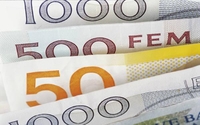 Just because mobile payments have not yet taken off as quickly
as some might like, it doesn’t mean there isn’t a need, at least in some quarters.
Just because mobile payments have not yet taken off as quickly
as some might like, it doesn’t mean there isn’t a need, at least in some quarters.
I was starkly reminded of this in the course of a recent quick trip to Europe. The way my travel
worked out, I had to overnight in London on the way to Germany.
Looking for the closest hotel to catch an early flight the next day, I checked to find that I was both landing and departing
from Terminal 5 at Heathrow, so booked the hotel officially named The Hilton London Heathrow Airport Terminal 5.
So how does one get from Terminal 5 to a hotel at Terminal 5? Take a bus, of
course. It turned out the Terminal 5 hotel was hardly at Terminal 5. Bad research on my part, to state the obvious.
Not having planned to be taking public transport, I neglected to convert any
of my US dollars or Euros to British pounds. Another big mistake on my part.
Walking out of the terminal, I watched my bus (#57) leave just before I reached it. I waited the 30 minutes for the
next one and was first in line to get on.
Since the buses were called Heathrow Hotel Shuttle, I wrongly guessed they would be complimentary. Upon boarding, the driver said the hotel ride would
cost about 5 pounds.
“Can you take euros?”
“No, cash
only.”
“U.S. dollars?"
“No, British pounds only.”
“How about a credit card?”
“Cash only.”
And there’s one of the opportunities for mobile payments, an
obvious thought running through my mind while scurrying back to the airport terminal in search of a currency conversion kiosk.
The bus had left by time I returned with the correct local
currency, so I waited another 30 minutes for the next one.
This wouldn’t have normally bothered me except that I had been battling with British Airways to get my luggage for well over
two hours after landing.
The highly computerized and automated luggage system determined my bag should go into overnight storage and sent along to Berlin in the morning, with my scheduled
flight, but that’s another story.
On an international scale, mobile payment systems have the ability to deal with different currencies and automatic conversions.
For example, my
American Express card is linked into Apple’s Passbook so that I receive an instant notification at every AmEx charge. After paying for a taxi from the airport in Berlin to the hotel, I received
a message showing how much I was charged, converted to U.S. dollars, before I even got out of the cab.
This is a great example of how some parts of the mobile commerce value chain are starting
to be connected, at least from the post payment to the notification stage.
Now if some of the earlier parts of the chain can get connected, mobile payments have a chance to move to great
scale.
Meanwhile, local cash is still king.
Have you had any similar experiences where mobile payments could have made your life easier?